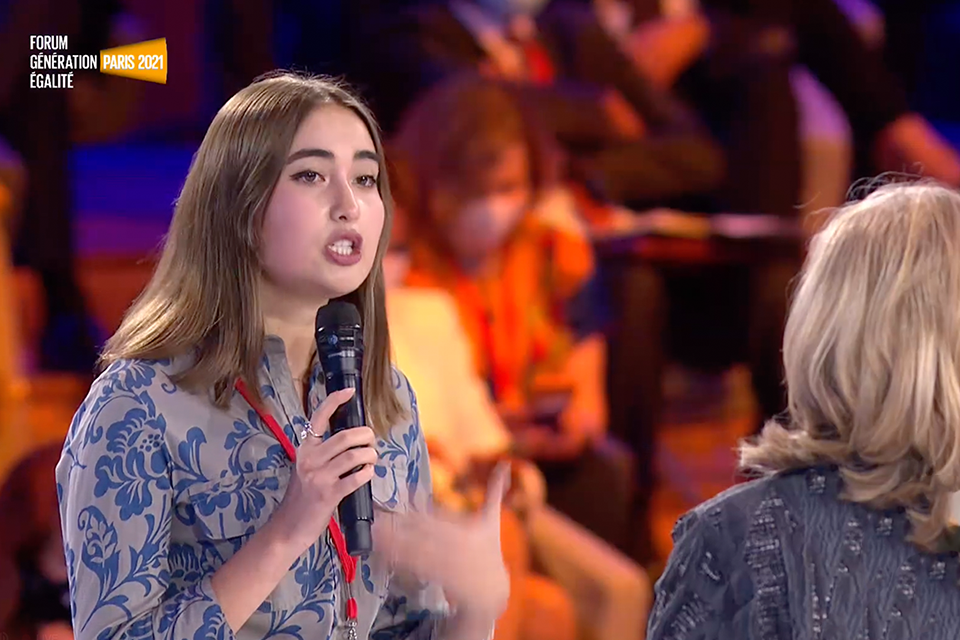Julieta Martínez: "The empowerment and inclusion of girls in decision-making processes is a transformative force to achieve a sustainable and equal future".
Julieta Martínez, a 17-year-old Chilean activist, is the founder of the Tremendas platform, to connect girls and young women who support social impact causes with their talent. She participated in the Generation Equality Forum, held in Paris from June 30 to July 2. She was part of the intergenerational dialogue in which progress and barriers to gender equality were analyzed, focusing on the Beijing Platform for Action and how it has evolved until today.Date:

How and when did your interest in feminism arise?
It began in my pre-adolescence, through reading and disconformity regarding school experiences, where I noticed the systematic absence of female characters. In facts and historical feats, they were absent and invisibilized. This motivated and motivated me to empower girls as agents of change, so that no girl would ever again feel that she was a "second-class" individual, or that she was alone.
What was your participation in the Equality Generation Forum?
My participation consisted of an intergenerational dialogue with former U.S. Secretary of State Hillary Clinton. We shared opinions and views on progress and barriers, focusing on the Beijing Platform and Declaration and how it has evolved to the present day.
I emphasized the importance of empowerment and inclusion of girls in decision-making processes as a transformative force to achieve a sustainable and equal future.
It was a symbolic space that sought to reflect how the older generations "pass the torch" to the new activists as a sign of trust, support and to express that this struggle belongs to all of us, including the next generations.
How will you give continuity from your platform to the commitments made at the Generation Equality Forum?
Tremendas made commitments in four areas of action.
In feminist action for climate justice, we will work on girls' education as a climate solution, as the main driver of change. We will continue our commitment with new versions of our Climate Academy, which seeks to train young girls as climate activist leaders and provide knowledge to identify problems and act to solve them. The academy offers 600 Latin American girls' quality environmental education from a gender approach.
In terms of technology and innovation for gender equality, we believe that in order to achieve gender equity through STEM we must bring these disciplines to girls from an early age, and with an innovative perspective.
From curiosity and demystification of the sciences, we can move towards parity disciplines that are available for a better society. Therefore we will build a STEM academy that will periodically train young women, girls and adolescents in Latin America and the Caribbean in biological sciences, astronomical sciences, technology and robotics.
On issues of bodily autonomy as well as sexual and reproductive health and rights, Tremendas will be based on the dignification of menstruation and the elimination of the taboo on the subject. We will manage and support campaigns that, from a sustainability standpoint, work on issues of menstrual dignity with the most vulnerable groups in society.
In the area of feminist movements and leaderships, we are committed, as Tremendas, to enable spaces that position girls, young women and adolescents as protagonists of the present. These will be binding spaces, where voices are not only present to give an image of diversity, but also to participate, act and intervene in an effective way.
We will do this by positioning certain issues on the agenda, and linking women leaders with decision-makers, so that they include the female and adolescent perspectives, which have been neglected. We also seek to connect Tremendas with those who leverage their talents and support causes.
We will work tirelessly for gender equality.
How do instances such as those in Mexico and Paris benefit the advancement of gender equality?
They are relevant, significant and ambitious instances where different actors of society come together, such as governments, civil society, philanthropies, the private sector, among others. It is an opportunity for world leaders, who have the means to generate systemic change, to unite under a common goal and commit themselves to concrete actions in favor of the necessary and urgent need for gender equality. A reflection of this are the results after the Forum, which not only generated ambitious commitments, but the exposure and public expression of leaders who are called to deliver to make a difference.
In general, what ideas do you propose to push the gender equality agenda forward and really achieve the Paris commitments?
I think it is important to follow up on the commitments, and to communicate progress in a transversal and transparent way to all sectors of society. It also seems to me that the role, projection and political involvement of girls is crucial to continue improving and enriching not only the dialogue, but also the actions that are carried out in these spaces, thinking about the future of the next generations - spaces that must be built in an intersectional, intergenerational and as inclusive way as possible.